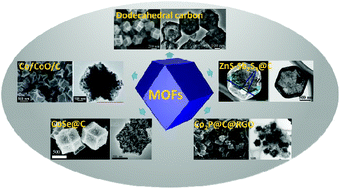Recent progress on metal–organic framework-derived materials for sodium-ion battery anodes
Abstract
Metal–organic frameworks (MOFs), self-assembled by metal ions and organic ligands via coordination bonds, have been broadly reported as an ideal template or precursor to design and prepare porous nanostructured materials for battery application, due to their high specific surface areas, porous structures and large pore volumes, as well as diverse and tunable structures. Versatile nanostructures, such as carbon, metal oxide, sulfide, selenide and phosphide, have been fabricated from MOFs through pyrolysis or wet chemistry strategies, which exhibit outstanding electrochemical performances for sodium-ion batteries (SIBs) because of well-defined nanostructures inherited from the starting MOFs. In this review, recent progress on MOF-derived materials for SIB anodes is summarized. The preparation methods, structure design strategies and structure–performance relationships are briefly introduced, and some insights into the future development of MOF-derived electrode materials for SIBs are discussed.

- This article is part of the themed collection: 2020 Inorganic Chemistry Frontiers Review-type Articles


 Please wait while we load your content...
Please wait while we load your content...